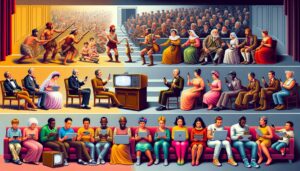The Digital Revolution: How Technology is Shaping Our World

Since the dawn of civilization, humanity has consistently sought to better its condition through innovation and technological advancement. Remarkable strides in various fields of technology have introduced profound transformations in how we live, work, communicate, and entertain ourselves. This blog post delves deep into the wave of digital transformation currently sweeping across society, revealing its implications and the potential cast on the horizon.
The Intersection of Technology and Daily Life
Our everyday affairs have become increasingly intertwined with technology. IoT (Internet of Things) devices, like smart home systems and wearable technology, have automated mundane tasks and brought unparalleled convenience to our lives.
For instance, smart home systems enable us to control our home environment remotely, adjusting anything from lights to thermostats. On the other end, wearable technology like fitness trackers enable us to monitor and optimize our health in real-time. This level of convenience and effciency was merely a dream a couple of decades ago but is now reality, thanks to relentless technological advancement.
The Revolution in Communication
The digital age has ushered in a new era of communication, breaking barriers of time and geography. Social media platforms like Facebook, Instagram, and Twitter have made it possible for people to connect effortlessly across the globe. Video conferencing tools such as Zoom and Microsoft Teams have revolutionized workplace communication, facilitating remote work and virtual collaboration.
While these platforms have brought immeasurable convenience, they’ve also raised new challenges related to privacy and misinformation. Thus, these issues present an imperative for society to strike a balance between leveraging these tools and mitigating their downsides.
The Ethical Implications of Tech Growth
The rapid growth of technology has been a double-edged sword. It has empowered society in various ways, but it has concurrently raised significant ethical issues. The rise of AI (Artificial Intelligence) and machine learning, for example, has led to debates about job displacement, privacy violations, and accountability over AI mistakes.
Determining who should take responsibility when an AI system causes harm is a complex and unresolved issue. Similarly, the increasing prevalence of data breaches and cyber threats highlight the urgent need for robust cybersecurity measures. As society hurtles towards a digital future, these are questions we must address.
Conclusion: Looking ahead
The digital revolution has profoundly shaped our society. From the way we communicate to the conduct of our everyday lives, technology has indelibly left its mark. However, it’s not without its drawbacks, particularly ethical quandaries that require careful consideration.
Even though we can’t accurately predict the trajectory of future tech growth, it’s clear that digital technology will continue to evolve, reshape, and challenge our way of life. Let’s engage in conversations and make decisions now that will guide its development responsibly. Together, we can steer the digital revolution towards a future that offers the best for humanity.
As we conclude this exploration, it’s clear that the revolution is not just about the technologies we create, but more essentially about the stories we tell and the conversations we have about them. Let us continue to engage, question and shape this story to ensure it is one that reflects our shared hopes and dreams for a digitally empowered future.






